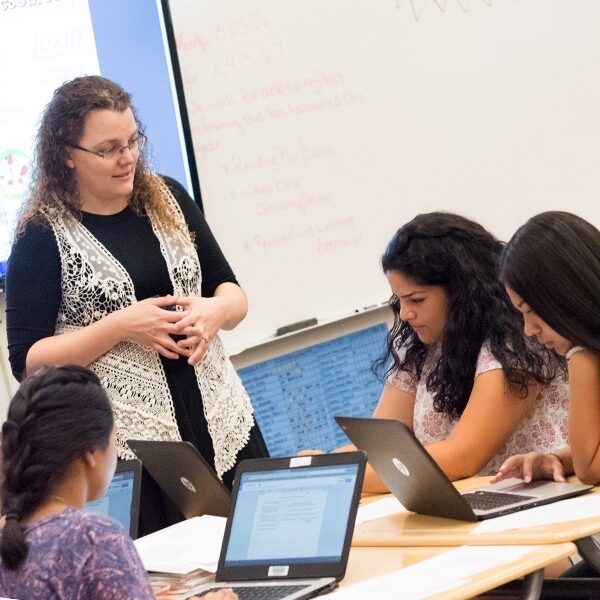
Schools across the country (and around the world) are in the throes of responding to the challenges of remote learning as a result of the novel coronavirus crisis. For the moment, many schools might feel as though they are in survival mode, but perhaps we can draw actionable lessons from systems uniquely poised to not only weather the storm but continue to provide robust, rigorous, and equitable learning. If there is any silver lining, it’s that more than ever, we can better understand and share the systems and processes that have prepared districts to tackle the challenges that we are currently facing — online learning, virtual curriculum, and inequitable access to technology.
As we consider both the current state and the future landscape of learning, what structures of digital access and learning need to be in place? What systems of educator development are necessary to support these required shifts? What competencies make the experiences of students meaningful and successful?
It might seem surprising that one of the districts best poised for a shift to online learning is located in a rural farming community that faced historical challenges to internet access. However, beginning in 2007, leaders in Lindsay Unified School District (LUSD) – a central California district that serves a low socioeconomic and largely Hispanic/Latino community — adopted a Strategic Design that values “Anywhere/Anytime” learning as a means to personalize education for every learner. The district’s unyielding focus on equity, student agency for lifelong learning, and personalized support has created the ideal conditions to make the transition to remote learning. By examining the structures and cultures that LUSD has established over the years, we can gain some insights into what might best support learners and educators in the coming weeks (and months).
1. Digital Access
The sudden shift to online learning has shined a spotlight on the gaping Digital Divide both in the U.S. and abroad. Although educators and advocates have campaigned for increased access to high-speed internet and devices for over two decades, the move to remote learning has revealed mass inequality.
Given that 100% of LUSD learners (the district’s term for students) receive free and reduced-price lunch, and that the district serves a county that is ranked below the poverty line, leaders recognized the problem of unequal access years ago. Because of its rural setting, LUSD realized that providing learners with internet access outside of school would require a community solution. In 2015, they launched a Community Wi-Fi Project — a multi-year endeavor to install nine distribution towers across the district and place hundreds of hotspots on people’s homes to provide free, filtered coverage.
When district leaders recognized that schools would need to close in response to COVID-19, they knew that their learners would have the internet access and the school-issued devices required for online learning. Further, because of their broader focus on ensuring learning could continue anytime and anywhere, they also knew that they had the protocols, procedures, systems, skills, and culture in place for their learners to be successful.
2. Protocols and Procedures
Beyond access, a second challenge facing schools and districts as they move online is a lack of understanding of how to operate within a virtual environment. Many students and educators are unfamiliar with how to login to different platforms, distribute content, and turn in work. Because of the district’s personalized learning model which incorporates technology throughout the learning process, LUSD learners and their teachers (whom LUSD calls learning facilitators) are comfortable navigating digital systems.
Lindsay learners know how to login to systems, and learning facilitators know how to get content and information to their students. Several years ago, LUSD began to use Empower — a learning management system designed to support personalized, competency-based learning — on a daily basis to help disseminate playlists, track progress, and monitor growth. Thanks to the development of protocols and procedures, the transition from a blended environment to a remote, online setting has been relatively seamless as it simply extended the work already happening throughout the district.
3. Systems
At The Learning Accelerator, as we reach out to districts and schools to see how we can best support them during this crisis, a common theme has been information overload. Teachers and leaders have struggled to weed through the sea of resources to identify tools and resources. However, LUSD educators do not have to think about how to get their curriculum online because it is already there. Over the past few years, leaders and learning facilitators in LUSD have worked to create a single sign-on system with Clever that connects not only to Empower but also Google Suite for Education and content-specific learning tools such as those in the Lindsay High School Software Suite.
4. Skills
Learning online requires both an understanding of the digital tools and the capacity to be self-directed as well as proactive. While the former set of skills might be relatively easy for today’s learners and educators to develop, the latter requires ongoing guidance and support.
As part of their strategic design to ensure opportunities for 24/7 learning, LUSD has invested in fostering student agency and developing their students as online/blended learners. Rather than requiring all learners to progress through content at the same time, learners in Lindsay progress through their personal objectives independently after consulting with their learning facilitator. This way, each learner can develop at their own pace and in their own way.
At the same time, educators also need sustained opportunities to both foster their technology skills and their ability to deliver personalized instruction. Over the past three years, as part of a federal Teacher and School Leader (TSL) grant initiative, educators in LUSD have been able to choose from a menu of high-quality professional learning opportunities. Even in the three weeks since the schools have closed, LUSD has already run multiple “virtual choice boards” days of professional learning targeted towards the specific skills required for remote instruction.
5. Culture
Moving online represents a dramatic shift in both the structure and culture of learning. Learners can now access content anywhere, any time, and essentially from anyone. This means that many of the systems that guide learning in a physical school — for example, curriculum pacing and set learning times — no longer apply. As students and educators move into remote learning, it may feel stressful or disorienting because they don’t have a culture in place to support it.
In Lindsay, leaders and educators have invested in creating a community that values individual learners and meets their needs through multiple modalities. When in school, learners have discovered how to navigate between self-directed learning time and teacher-led instruction. Because of this culture of personalized learning, LUSD students have learned to be active participants in their learning. By taking ownership in the process, learners not only attain mastery of the content, but also gain life skills to be successful beyond the four walls of the school.
By looking back at all that LUSD has accomplished and established over the past several years, schools and districts may be able to identify a blueprint for how they can best move forward out of this current education crisis as well as transform their thinking about school whether it occurs in person or online.

